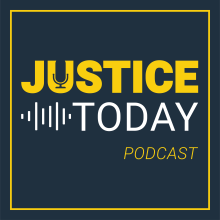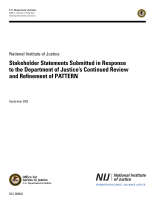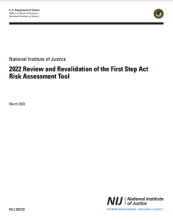Justice system reform
Building Better Indigent Defense Systems
A multilevel analysis of juvenile life without parole and its reform: understanding the people, places, and politics that shape policy.
California: A Decade of Decarceration
NIJ FY 2022 Invited to Apply - Research on the Impact of Public Policy on Racial and Ethnic Disparities in the Justice System
Pretrial Policy Change and Place: Evaluating the Impacts of Maryland's Bail Reform on Crime and Pretrial Outcomes across Courts
Just Wrong: The Aftermath of Wrongful Convictions
See the YouTube Terms of Service and Google Privacy Policy
The strength of our criminal justice system depends on its ability to convict the guilty and clear the innocent. But we know that innocent people are sometimes wrongfully convicted and the guilty remain free to victimize others. The consequences of a wrongful conviction are far-reaching for the wrongfully convicted and the survivors and victims of the original crimes.
The documentary Just Wrong: The Aftermath of...
Meeting People Where They Are to Improve Institutional Culture
Stakeholder Statements Submitted in Response to the Department of Justice's Continued Review and Refinement of PATTERN
2022 Review and Revalidation of the First Step Act Risk Assessment Tool
A tale of two laws revisited: Investigating the impact of the Prisoner Litigation Reform Act and the antiterrorism and effective death penalty
Final Technical Report: Habeas Litigation in US District Courts
Congress, Courts and Corrections: An Empirical Perspective on the Prison Litigation Reform Act
Statewide Law Enforcement Crime Research, Evaluation, and Analysis
An Analysis of Black-White Racial Differences in Public Support for Nonviolent Sentencing Reform
Sentencing Reform in the Other Washington (From Crime and Justice: A Review of Research, Volume 28, P 71-136, 2001, Michael Tonry, ed. -- See NCJ-192542)
NIJ (National Institute of Justice) Director Emphasizes Community Policing in Keynote Address
Just Science Podcast: Just Trauma-Informed Approaches and Advocacy for Vulnerable Populations
Courtroom Communities: Criminal Case Processing and Sentencing Reform
The downside of downsizing: Persistence of racial disparities following state prison reform
Just Science Podcast: Just Reforming Pretrial Policies
You Get What You Measure: New Performance Indicators Needed to Gauge Progress of Criminal Justice Reform
Booker and Beyond: Analyzing Sentencing Reform and Exploring New Research Directions






